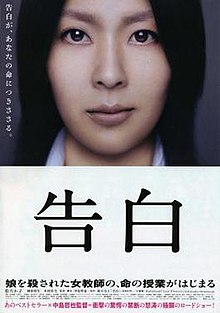Confessions (2010 film)
| Confessions | |
|---|---|

Film poster
|
|
| Directed by | Tetsuya Nakashima |
| Written by | Tetsuya Nakashima |
| Based on |
Kokuhaku by Kanae Minato |
| Starring | Takako Matsu |
| Edited by | Yoshiyuki Koike |
| Distributed by | Toho Company |
|
Release date
|
|
|
Running time
|
106 minutes |
| Country | Japan |
| Language | Japanese |
| Box office | $44.9 million |
Confessions (告白 Kokuhaku?) is a 2010 Japanese drama film directed by Tetsuya Nakashima, based on housewife-turned-author Kanae Minato's 2008 debut mystery novel that won the 2009 Honya Taisho award (Japan Booksellers Award).
The film was both a commercial and critical success. It was awarded Best Picture at the 34th Japan Academy Prize and 53rd Blue Ribbon Awards and was shortlisted at the 83rd Academy Awards for Best Foreign Language Film.
Junior high school teacher Yuko Moriguchi (Takako Matsu) announces to her class that she will resign before spring break. Moriguchi reveals that because the HIV-positive biological father of her daughter Manami was ill, she used to bring Manami (Mana Ashida) to school with her. One day, after school, she returned to the room where Manami was but found her gone. Her daughter was later found drowned in a school swimming pool. She then explains that two pupils in her class, whom she dubs "Student A" and "Student B", have murdered her four-year-old daughter.
She had found a small bunny purse amongst Manami's belongings which should not have belonged there, which led her to question Shuya Watanabe, one of her students. Shuya, who immediately admitted killing Manami, mocked her compassionate reaction to his feigned expression of remorse with "just kidding". She also questions Naoki Shimomura, who once saw Moriguchi refuse to buy Manami the small bunny purse at a store. She speaks with Naoki and his mother at his home, however his mother only feels bad for her own son and expresses no remorse for Moriguchi's daughter's death.
Having revealed their identities, she explained that because the killers, as minors, are protected by the Juvenile Law of 1947, turning them in wouldn't make a difference. So to exact revenge on them, she admits injecting her late daughter's biological father's HIV-contaminated blood in the milk cartons of the two students who she claimed to have murdered her daughter. The rest of the film switches between the aftermath of Moriguchi's confession and the events before the confession through a series of first-person narratives from Moriguchi and her three students.
...
Wikipedia
